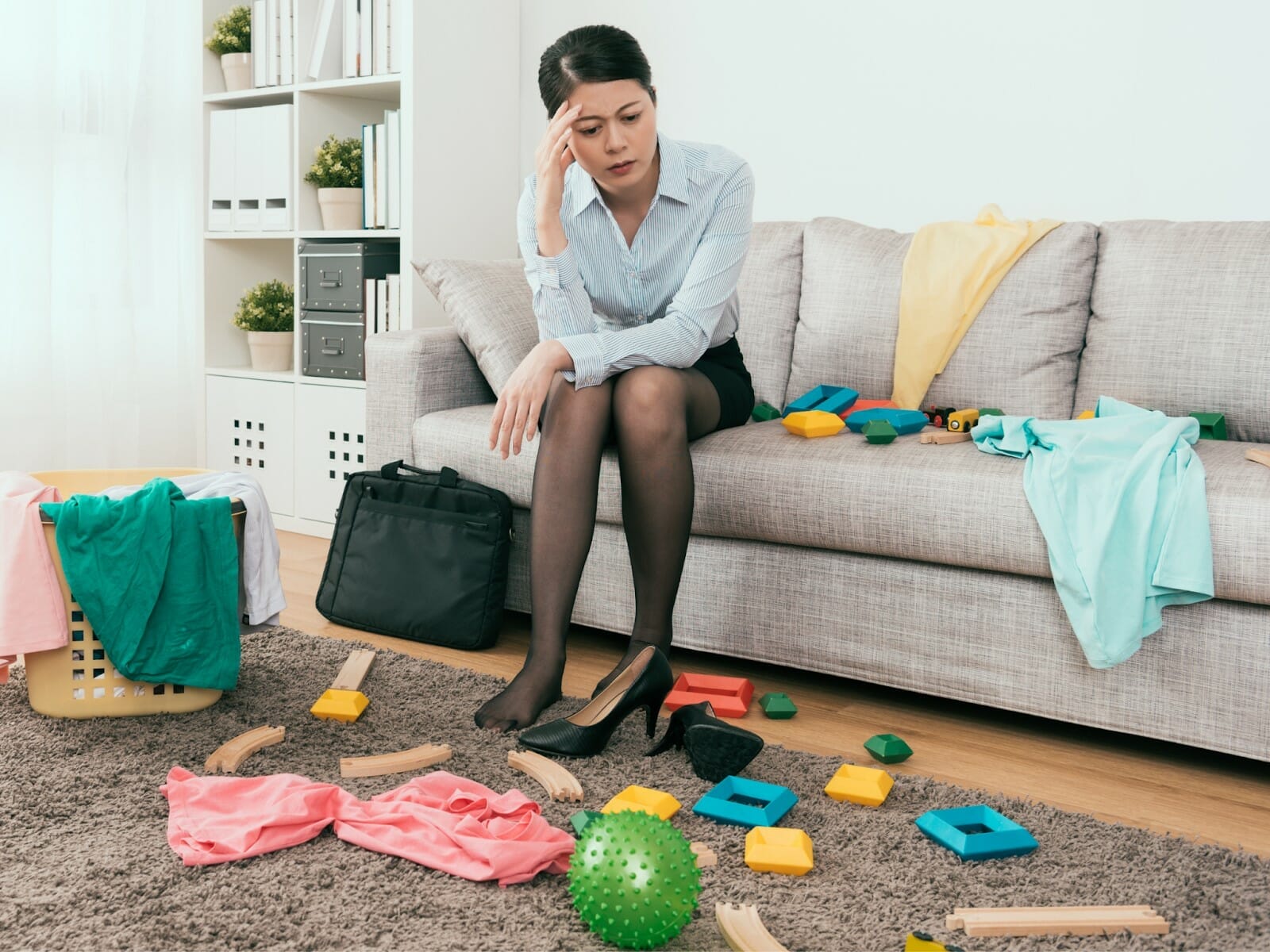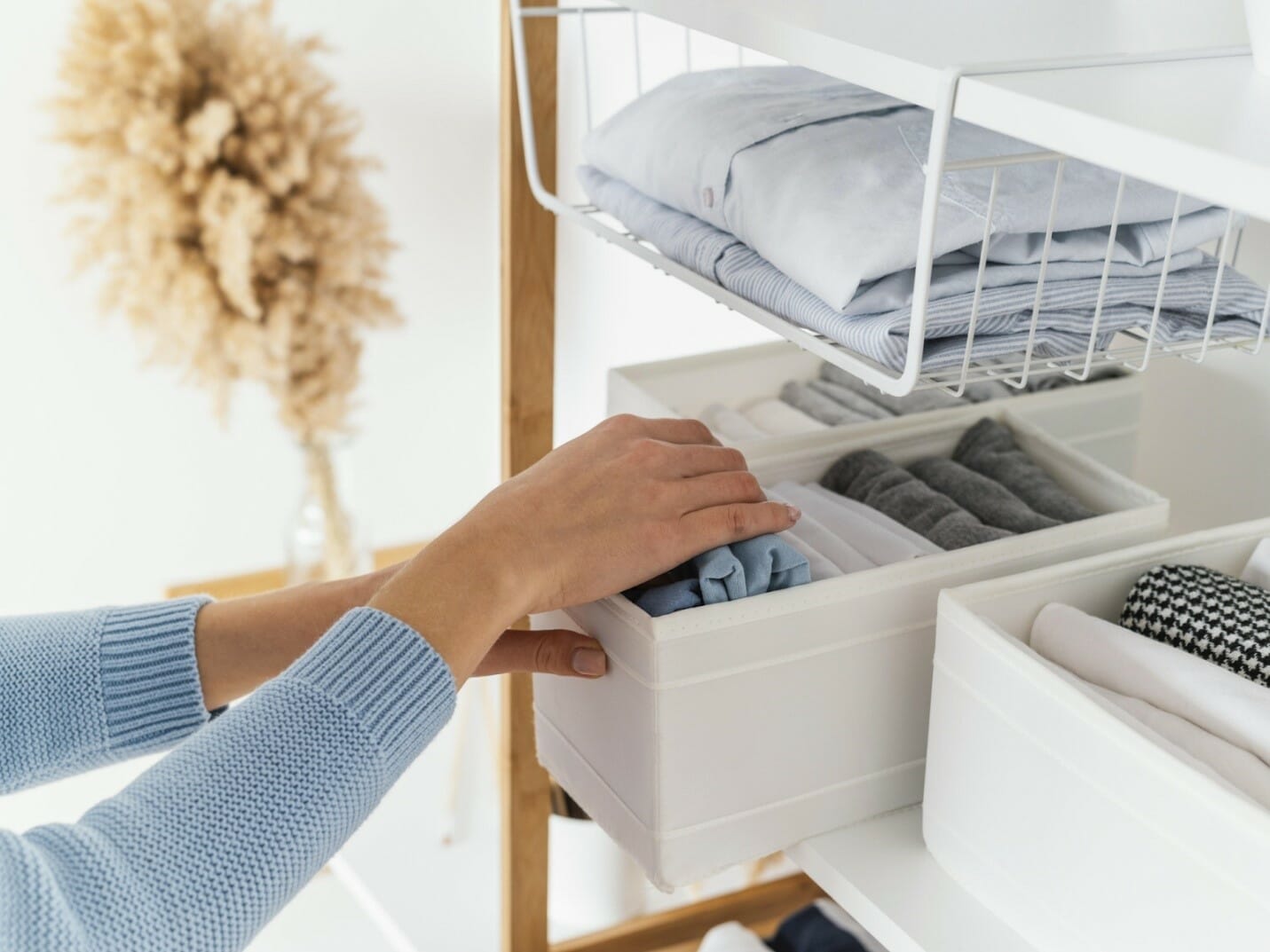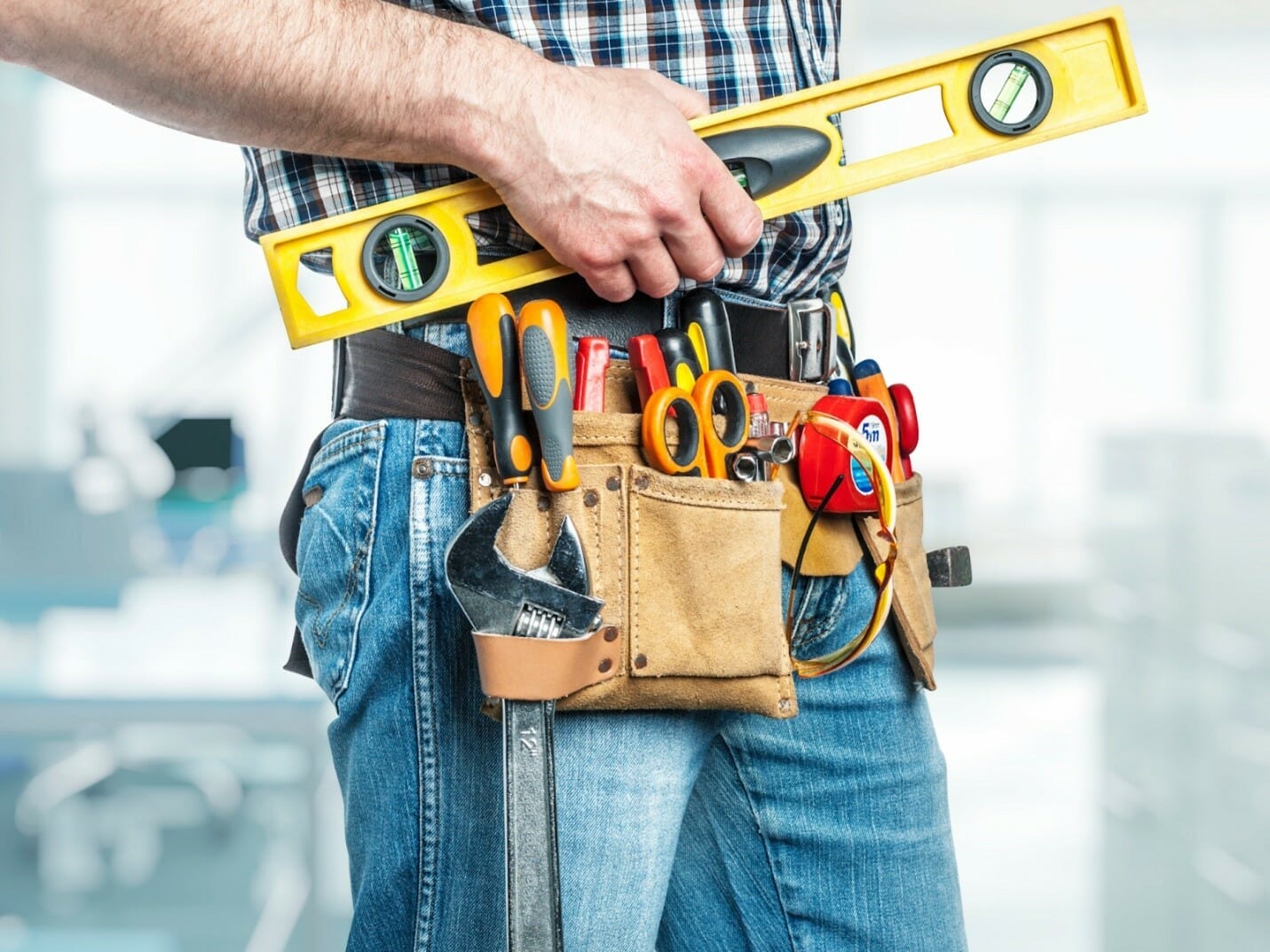
There are varied reasons people hang on to things they don’t need based on their circumstances or deeper-lying struggles. A cluttered home—even one that would qualify as a Level 5 situation—doesn’t stem from laziness or lack of willpower.
More often than not, a cluttered home is the result of a difficult-to-control situation, which is part of normal life.
What’s the source of your clutter? Following, are a few factors that may be contributing to your at-home clutter:

Having children can bring an abundance of joy, but also plenty of clutter.
Baby gear that is only used for a short period of time, rapidly changing clothes sizes, and piles of toys accumulate quickly.
It doesn’t end with the baby phase, though. As all guardians know, older kids and teens bring their own messes into the home.
Food-related messes combined with sleep deprivation can make it difficult to keep up with housework.
With children leaving clutter everywhere and food-related messes needing immediate care, it can be difficult to keep up with housework. Especially when you consider the sleep deprivation that also comes with kids.
Between art and science projects on the counter and smelly gym bags and laundry
left around the house, things can get (or stay!) messy.
It doesn’t help that children aren’t well-known for cleaning up after themselves!

As adults age, they may struggle to keep up with their housework.
Think of all the reaching and bending over. Consider all the hard scrubbing. With health issues, simple cleaning tasks take much longer to accomplish, if it can still be done.
Decreased mobility and increased health issues can make cleaning overwhelming or even impossible.
In addition, it can be difficult to let go of possessions accumulated over a lifetime.
Anxiety can make it difficult to throw away possessions.
People with anxiety may hold on to items in excess in case of a feared emergency or indecision about what to do with items.
Finding the motivation to clean and declutter is often a struggle for someone suffering from depression.
The stress of an out-of-control home situation (whether it’s actually out of control
or simply perceived to be) can create a negative feedback loop.
For example, maybe you’re struggling with depression and lack the motivation to do the dishes. This means the dishes quickly pile up and within a week or two every surface in your kitchen could be covered in dirty dishes.
Now, you’re facing an overwhelming mess that can make you feel even worse—piling on exhaustion, guilt, and shame—and making you even less likely to find the motivation to clean up.
This cycle can leave those struggling with depression feeling more overwhelmed and less able to approach their home situation.
Individuals with ADHD often have intense, passionate interests and may accumulate items related to that interest. In addition, it can be difficult for a person with ADHD to create and stay focused on a plan for a big cleaning project. Anytime there are multiple steps involved, it’s easy for people with ADHD to get distracted.
Obsessive-compulsive disorder is characterized by obsessive, intrusive thoughts and compulsive behaviors. People with OCD sometimes deal with anxieties and emergencies by compulsively buying items. They may have obsessions about running out of essential items or a buying ritual that is difficult to break out of.

Trauma can be a trigger for accumulating clutter. If someone grew up without:
They may feel driven to hold onto things rather than throw them away when they are no longer needed. Research shows that childhood emotional abuse and physical neglect in particular predict higher levels of hoarding symptoms.
People who have experienced loss may also accumulate possessions to soothe the ache of missing their loved one. Buying new things triggers a brief dopamine high, bringing temporary emotional relief.

If you grew up in a home where clutter was common, you are more likely to show these behaviors yourself. You may have a genetic disposition toward it through related diagnoses like anxiety or depression. You may also be more used to an environment where clutter, mess, and even the higher levels of hoarding are the norm.

No matter the reason clutter starts, it’s normal to feel overwhelmed and stressed by the situation. Home maintenance is a big task under any conditions. Certain factors can make the situation feel impossible such as:
Stress can lead to disorganized homes, and disorganized homes can increase stress. Natalie Christine Dattilo, PhD, clinical health psychologist and instructor of psychiatry at Harvard Medical School, calls it a chicken-or-egg dilemma.

“Recent studies have shown that clutter in our homes is associated with higher cortisol levels [our stress hormone], but it’s still unclear which comes first,” says Dattilo.
“Is it that when we are under stress, our ability to maintain a well-organized home becomes impaired? Or when our home is in disarray, does that make us feel more stressed, overwhelmed, and anxious?”
Regardless of the root of the issue, there is a way out. Resources are available to help you deal with your home situation. Bio-One can help! Our services can help ease your stress. For more information on how we can help you with your clutter call (510) 274-1548.

What is stopping you from getting the clutter in your home under control? It might be that you’re overwhelmed—and that’s okay. Maintaining and cleaning a home is a huge task. When you’re trying to do it by yourself amid many other responsibilities, you might not be able to do it all.
Fortunately, you don’t have to do it yourself. There are many support systems out there to help you manage your home. If you’re feeling overwhelmed, you can reach out for help.

Family members are often the first ones to step in when you need extra hands. If you live with a partner, children, or other family members, they should already be taking on a share of the housework as appropriate to their age and health status.
Friends and other family members are also often willing to lend a hand to help with a limited-scope cleaning project, such as:
If you find yourself facing any of these, you could ask a loved one for help.
Sometimes, you might need more help with your house than your friends and/or family are able to give—and it’s important to realize that’s completely okay! There are many different types of people who can help you get your house under control when it gets overwhelming.

If your schedule makes it difficult to stay on top of cleaning tasks, hiring a house cleaner can take some of the burden off your shoulders. You can hire them to come on a set schedule, like weekly or monthly, or schedule a cleaning every now and then when you need extra help—or even just bring them in for a deep clean spring cleaning to get your home back on track.
An excellent way to start when you’re looking to hire someone to come help is by asking around to friends and neighbors. Who do they use and recommend? Another good source is neighborhood mailers like Valpak that include coupons for local services.
However, no matter who you hire, it’s important to understand that house cleaners typically do not pick-up, declutter, or organize homes. Rather they clean:
Whether you hire someone to clean the entire house or ask them to focus on key areas, like the bathrooms or kitchen, you may need to pick up clutter before they come over. This makes it easy for them to access the surfaces that need to be cleaned.

If the idea of picking up all the clutter for a house cleaner to come over is overwhelming, an organizer may be the helper you need.
Professional organizers consult with you about how best to manage and store your belongings. They may physically come into your home or meet with you virtually to help you come up with a clutter strategy.
Organizers will help you troubleshoot the reasons for your clutter, find strategies to deal with it, and give you accountability to take care of it.
Depending on the organizer and whether they meet with you in person or virtually, they may help you move items, but they aren’t cleaners. Their primary goal is to help you find your own sustainable strategy for a decluttered space.
Similar to hiring a house cleaner, you should start your hunt for a professional organizer by asking around to friends and neighbors. Community mailers and social media groups are also good places to check, and finally, a good, old-fashioned Google search can help you find reputable professionals in your area.

Sometimes, broken appliances or structures in the home can cause a barrier to cleaning. It can feel like you can’t get things done because there is an issue you can’t fix on your own.
A handyman can take care of minor repairs in your home.
They can also install shelves—a great asset when you’re trying to be more organized!
Check out websites like Angi (formerly Angie’s List) or Thumbtack for reviews of handyman services ranging across all sorts of specialties. Community social media groups, mailers, and friends and neighbors are all also good places to turn for recommendations.
Often, our cleaning struggles stem from a deeper source.
Many of us are not just messy—we may be unmotivated due to depression or anxiety, struggling to focus on cleaning due to ADHD, or dealing with any number of other hurdles. In these cases, hiring a cleaning service is putting a bandaid over the problem.

To see lasting change, it can be helpful to enlist a mental health specialist to help you find your equilibrium. There are a wide variety of resources available. For a complete list, check out this article from the National Institute of Mental Health.
Even if you don’t have a formal mental health diagnosis, talking with someone about ways to cope with the stresses of daily life can make a difference in your motivation and ability to troubleshoot problems.
You can find mental health support from a variety of practitioners, including:
Sometimes, your home needs a coordinated team to tackle all the different areas in need of cleanup and repair.
If your home has so much clutter that:
You’ll want to enlist help that can safely and efficiently take on the challenge.
When you work with a specialized cleaning team like Bio-One, you’ll start out by meeting one of our team members to discuss your goals and situation.

They’ll investigate any safety hazards and ask you questions about what you want them to preserve in the home, what should be cleaned, and other goals unique to you.
When the team begins work in your home, they will do all in their power to keep their work discreet, including changing into protective gear in your backyard or garage if desired and using unmarked vehicles.
You will be looped in throughout the process of Bio-One’s decluttering and deep-cleaning work.
Imagine the relief you’ll feel knowing your home is in good hands.
If Bio-One’s cleanup services sound like what your home needs, give us a call anytime at (510) 274-1548. Our lines are open 24 hours a day, 7 days a week, 365 days a year. You can also fill out a service request on our website.
There’s no shame in needing help with your home. At Bio-One we’re here to guide and support you through the process.